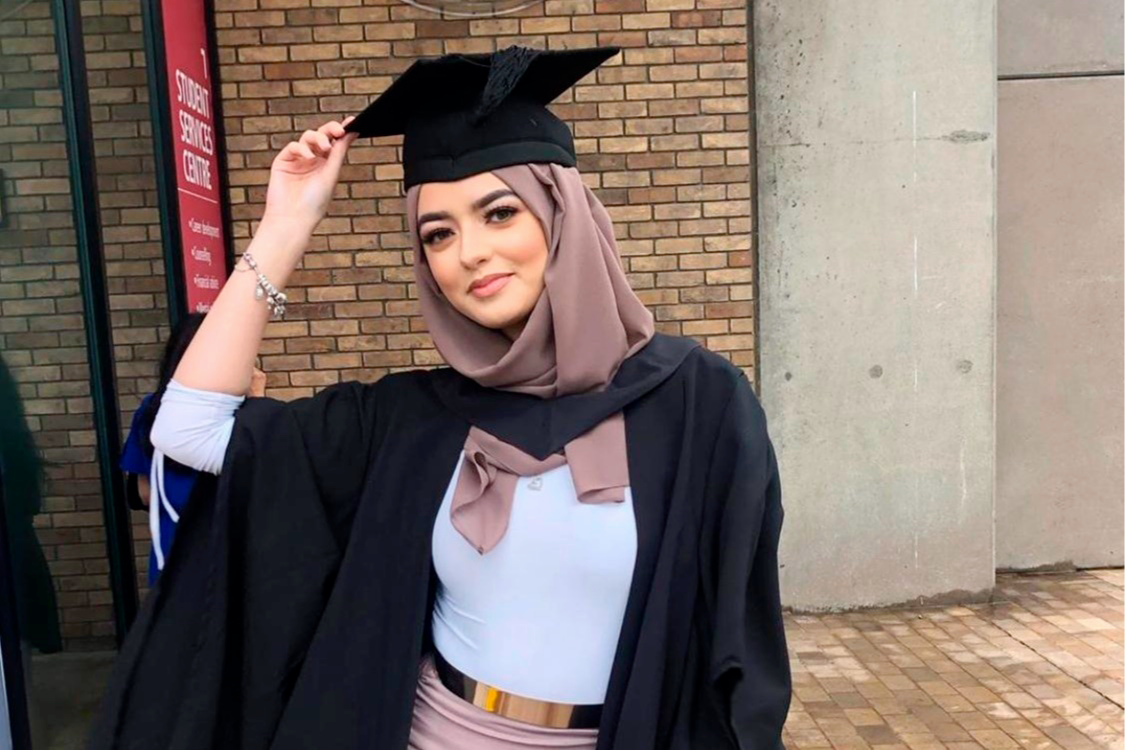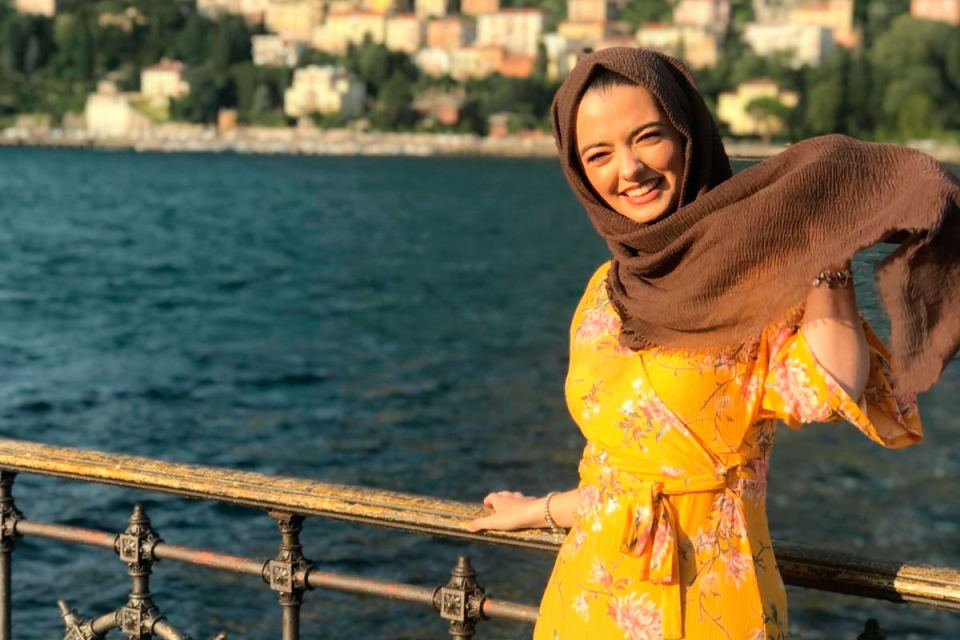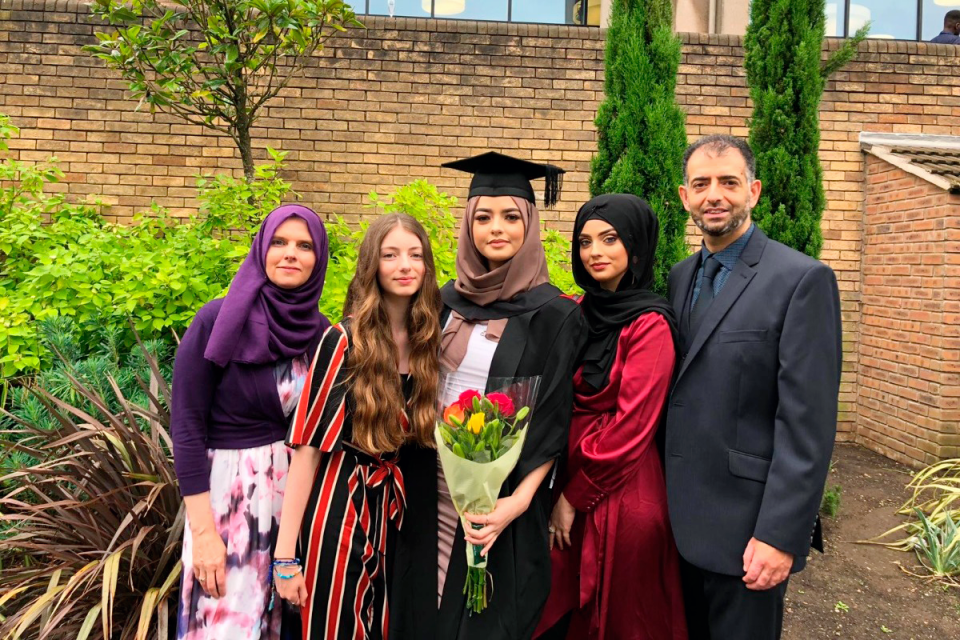Graduate, 22, with advanced brain cancer forced to fundraise £100,000 for German treatment

The family of a law graduate with advanced brain cancer had to fundraise for her to receive an experimental drug that is not available on the NHS.
Amani Liaquat, from Luton, collapsed from a seizure on her 22nd birthday on 29 April.
Doctors later revealed Liaquat had a grade four glioblastoma multiforme tumour, with patients typically living just 12 to 18 months post-diagnosis.
With medics working to extend her life, Liaquat underwent six weeks of radiotherapy, followed by a planned regimen of low-dose chemotherapy. During the chemotherapy, however, a scan revealed Liaquat’s tumour was growing.
Doctors decided to stop her chemotherapy, prompting Liaquat’s family to research treatment options outside of the NHS.
Read more: Teen has battled a brain tumour for over half her life
Trial results suggest the experimental drug ONC 201 has shown promise in other patients with Liaquat’s tumour. After fundraising £100,000 ($132,279) in just 24 hours, Liaquat’s father Khuram flew to Germany to purchase the life-extending treatment.
With it being unclear whether the medication is having an effect, Liaquat’s family continue to “pray she is blessed with shrinkage of her tumour”.

‘Our daughter was a shadow of her self’
“Amani was studying for her Masters with a view to pursue her dream of becoming a social worker, having graduated with a first class degree in law,” said Khuram.
“Her whole life was turned upside down in a matter of a month.
“Her studies were halted, her dreams of a fulfilling career shattered and her fiancé decided he no longer wanted to go ahead with their planned September wedding.
Read more: Brain cancer patient given six weeks to live ‘still fighting’ two years on
“Due to her illness her studies and pursuit of her dream career was abruptly put on halt, her future plans in her own personal life were snatched away and all this while she was trying to deal with the uncertainty of her own health.
“The burden of such a change proved too much for Amani and for several months our daughter was a mere shadow of her former self.”
Watch: The Wanted’s Tom Parker plays with daughter after his brain tumour diagnosis
‘The most gruelling time any of us have experienced’
Hours after enduring her first seizure on her birthday, Liaquat was given the “awful news” she had a brain tumour.
The graduate spent four days at Luton and Dunstable University Hospital, before being transferred to the National Hospital for Neurology and Neurosurgery in London for a biopsy.
Liaquat spent eight days at the London hospital, undergoing tests and surgery that left her with 15 staples in her head.
“Due to COVID restrictions on visiting, she had to deal with all of that and difficult conversations with medical professionals all by herself,” said Khuram.
Read more: Boy diagnosed with leukaemia weeks after his twin died of a brain tumour
Liaquat was discharged on 10 May, however, the worst was yet to come.
“Two days later, we were given the news Amani’s tumour was a grade 4 glioblastoma multiforme with H3K27 mutation, which was cancerous and inoperable,” said Khuram.
The tumour is said to lie so deep within the brain that it cannot be removed surgically, as well as being particularly resilient to conventional drugs.
Nevertheless, Liaquat began radiotherapy followed by chemotherapy on 26 May. The chemotherapy had to be pushed back a week when the graduate tested positive for the coronavirus.
“With all the family suffering from the virus and still in shock from Amani’s diagnosis, it was the most gruelling time any of us have ever experienced,” said Khuram.

After overcoming the coronavirus, Liaquat was due to have 12 cycles of chemotherapy. During her first round in August, however, the graduate became unsteady and developed pain in her temples.
An MRI scan revealed her tumour had grown.
“It was utterly devastating to be advised Amani’s chemo should be stopped, but we were even more determined to fight on,” said Khuram.
“Treatment options in the UK for glioblastomas are very limited and, in discussions with her medical team in London, we decided the best way forward would be to access a new trial drug, ONC 201.”
ONC 201 has shown promise among patients with similar tumours.
Read more: Teen has surgery to remove tumour on anniversary of his mother’s death
Clinical trials into the drug are ongoing in the US, however, the logistics of travelling amid the pandemic along with the cost of Liaquat’s insurance meant she was unable to be a participant in any of the studies.
ONC 201 is said to cost £4,000 ($5,291) a month. Anticipating a year’s supply being required and the expense of medical consultations, the family set out to raise £50,000 ($66,141).
A GoFundMe campaign brought in £100,000 in just 24 hours, allowing Khuram to fly to Germany where he purchased three months’ worth of the drug.
“Amani will continue to take it for as long as she can tolerate it,” he said.
“I can’t help but think of other families who, like us, are having to somehow find the money to do this.
“We are all under enough stress without having to co-ordinate fundraising campaigns for life-prolonging drugs.”
‘We have watched our daughter decline’
Liaquat’s family are working with the charity Brain Tumour Research to raise awareness of the disease that kills more children and adults under 40 than any other cancer.
They are supporting the charity’s petition to increase national investment into brain tumours to £35m ($46.2m), bringing it in line with the funding given to other cancers like breast, prostate and leukaemia.
“The implications of a brain tumour diagnosis are far more wide reaching than one can imagine,” said Khuram.
“We have watched our daughter decline physically, neurologically, mentally and emotionally.
“We know through our own research that there are a number of other drugs which have shown promising results in aggressive glioblastomas.
“Surely patients with such aggressive brain cancers should be able to access these drugs on a compassionate basis at least once standard of care has been completed and shown to be ineffective?
He added: “We will continue to do all we can for Amani, and pray she is blessed with shrinkage of her tumour and easing of her symptoms, and that we can hope to find a cure.”
Watch: Patient plays violin during brain surgery



